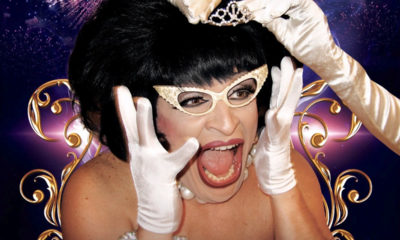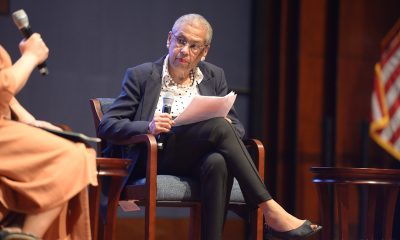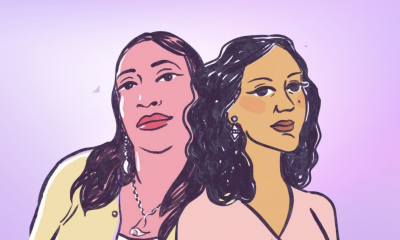Arts & Entertainment
Drama queens
Logo’s ‘A-List’ returns Monday; cast dishes on Reichen’s full-frontal pics, ‘evil’ Austin; Crews follow cast six days per week

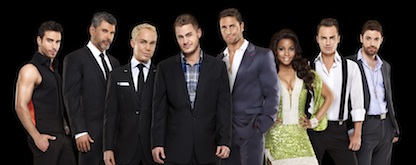
The cast of Logo’s ‘A List: New York’s’ second season, which returns Monday night. From left are Rodiney Santiago, Mike Ruiz, Ryan Nickulas, Austin Armacost, Reichen Lehmkuhl, Nyasha Zimucha, Derek Saathoff and TJ Kelly. (Photo courtesy of Logo)
It’s the show gays love — and love to hate. But many, of course, end up watching anyway.
TV’s gayest, guiltiest pleasure — even its creators embrace the “guilty pleasure” label — is back. “A List: New York’s” second season debuts Monday at 10 p.m. on Logo. The entire season one cast returns for 11 new episodes, this time with a gal pal in tow. The Blade spoke with the cast and crew to get the lowdown on the new season, find out what it’s like shooting the controversial series and ponder the show’s appeal.
The reality show, from the same people (True Entertainment) who brought “Real Housewives of Atlanta” to the air, debuted last October and follows the lives of five gay (and one bi; six total) men in New York who claim they’re at the top of the Manhattan social totem pole through their lives, loves and career ventures. Reality show vet Reichen Lehmkuhl (he won the fourth season of “Amazing Race” and formerly dated Lance Bass) unofficially heads the cast. A central theme of the first season was his tempestuous relationship with Brazilian model Rodiney Santiago, with troublemaker Austin Armacost never missing an opportunity to keep their social pot stirred.
It was a hit and helped, along with “RuPaul’s Drag Race,” put Logo, which debuted in 2005, on the pop culture map. The channel, owned by Viacom’s MTV Networks, won’t release ratings for the show but says it’s the second-highest rated show in the gay channel’s history (after “Drag Race”). A Dallas-based spin-off is planned for a fall debut.
The show’s reception has been wildly mixed. Some reviewers and fans say it’s great to see a gay-centric reality show instead of a mainstream show with token gay characters. Others have been appalled at what they say is a superficial and stereotype-laden cringe fest. Still others agree with that assessment but admit it’s well constructed and addictive.
Executive producer Dominic Pupa, who’s gay, says the show is “absolutely” a guilty pleasure and says the critical drubbing doesn’t mean it’s not successful at what its creators are aiming for.
“People roll their eyes all the time, but it captures people’s attention because it’s three things — people with means and access who live in New York. That trifecta of factors means it’s fascinating to watch. There’s something fun about people who are of means and do have access and discovering their lives can be just as exciting, dramatic and disappointing as yours. Plus it’s an ensemble show and people love ensembles because they can pick their favorite and tune in to see how they’re faring. Even the ones people hate — I hate to say character because it’s reality, but in the sense of being a dramatic narrative, they do sort of become characters — you still love to watch the ones you hate.”
Reichen, during a gym break (it’s legs-and-shoulders day; he goes seven days a week), says he learned early on to let go of the naysayers. It was also hard, he says, watching the first season and seeing how much was left out that would have added context to some of the less-flattering scenes.
“I used to read the blogs but then half way through, I stopped. I got rid of my Google alert and I have become a much happier person,” he says. “I kind of live in my own world. There were so many comments about my relationship with Rodiney, they said I didn’t care about him, I just brought him here and dropped him, but the truth is I made sure he had everything he needed and every opportunity he wanted and you know got him on his feet so he could pursue the stuff he wanted to do. It was such a slap in the face to watch this kind of play out in a very one-sided way … Rodiney knew it too. He was like, ‘Oh my god, he tried his best and Reichen’s not like that with me at all.’”
Letting go of the negative energy has centered Reichen in other ways, he says. It helped him shrug off the full frontal nude photos that surfaced recently of him. He admitted the photos — shot from the neck down — are of him.
“If that had happened five years ago, I think I would have shut myself into a mental institution,” he says. “But now my skin is so thick, I knew as soon as they surfaced, there would be every possible reaction. People would make fun of me, they would hate me, some people would like them — you just get to a point where you can deal with it whether it’s good or bad. It totally sucks that they surfaced without my permission — it was supposed to be a private thing, not something I broadcast for the whole world … but I wasn’t gonna pull an Anthony Wiener and lie about it. I was like, ‘Yeah, it’s me, go ahead and start shooting your arrows and let’s get it over with.’ I did mention that a lot of gay men do this kind of thing. I don’t feel I did anything immoral or illegal. It just so happens that because it was me, people cared.”
Rodiney agrees the show complicated their dating life and admits he was naïve about what he was getting into when he signed on.
“Last year was not easy for me,” he says. “It was very intense. It’s like I do the show and I forget I have the cameras with me but it’s who I am and they’re shooting me. There were a lot of difficult people who liked to create drama in my life. I’m the kind of person who just wants to live my life and not worry about somebody else’s life.”
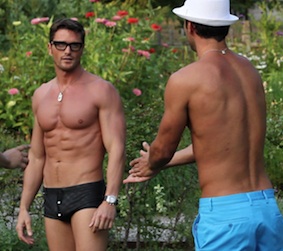
Reichen Lehmkuh (left) and his then-boyfriend Rodiney Santiago in a scene from the show’s first season. (Photo courtesy of Logo)
The couple broke up in November, shortly after the first season started airing. Rodiney admits the show was a factor. Might they still be together without “A-List”?
“I’d say it was half and half,” he says. “The show helped us to break up. We started to date and moved to New York together just six months into the relationship. It was very stressful for us. I can’t handle that.”
Reichen says he and Rodiney are now “friends in the best way possible” and says the second season has been much easier to shoot since he’s not in a relationship.
“It’s been more focused on my business ventures,” he says. “When it comes to the drama, I’ve been off the pedestal in the best way possible.”
New this season is 25-year-old Nyasha Zimucha, a straight entrepreneur and mega-achiever who runs her own business, hair-and-wig shop Embrace Your Hair. She was previously a judge on Little Miss Perfect. She’s a native of South Africa and came to the United States in 2001. She’s been in New York three years and knew “A-List”-er Mike Ruiz before joining the cast.
She says her presence adds an interesting punch to the new season.
“I think you’re going to be very entertained at how some of these relationships develop, both positive and negative,” she says. “It’s an interesting mix. Here you have this straight black girl with these six white, very handsome, very accomplished gay men. I think it’s historic because there’s really been nothing like it on television. You’re going to see not just the fights but the fun too, and I think that will be fun for the audience.”
The second season is still taping even as its first episodes are set to air. Three are fully edited and in the can. Pupa says he doesn’t know how long they’ll shoot — until he feels they have enough footage to bring the storylines to a sensible conclusion.
So how organic or contrived are the scenarios and does editing, obviously a necessity, sometimes distort the narrative?
“Like on any show, we like there to be a beginning, a middle and an end,” Pupa says. “You want to see the cast members start somewhere and end somewhere else. For each one it’s different. Last season we were still shooting until 10 days before the last episode, which is really unusual for this type of show … but it’s a lot more real than people think. They think it’s all very planned out but it’s really not. We ended last season with an argument between Austin and Reichen. That happened less than two weeks before it aired.”
None of the participants were contractually obligated to return for the second season. And the producers don’t tell them they have to meet with certain people or attend certain events. They take suggestions, though, and say they want to do their part to make the show as compelling as possible.
“It’s a nice relationship with cast and production,” Reichen says. “We all understand the result is trying to create something that people will want to watch.”
Camera crews follow cast members six days per week for about 10 hours each day when the show is shooting. Pupa says the cast does its best to schedule things more likely to be interesting when the show is shooting and save the boring stuff — like meeting with lawyers for their business ventures — off-camera. Reichen, for instance, says he traveled much of the six months between the two seasons, though he did see all the cast members at least once during that time, most often at charity events, which he says draw little media attention. He guesses he was only in New York for about 60 days of that six months. He’s been busy prepping a new book and getting ready to launch a fragrance line.
Often the best moments happen when the full cast is together.
“That’s when we have the greatest dynamic,” Pupa says. “Everybody loves Ryan. If he’s throwing a party, you know the whole cast will be there. If Austin throws a party, we don’t know who will walk through the door.”
And what about Austin — is he really the troublemaker he seemed to be from season one?
Reichen says there’s “some stuff” between them that goes down in season two. “You’ll just have to watch,” he says.
Rodiney has a tougher assessment.
“I don’t trust him and we cannot be friends,” he says. “He’s the kind of person I want him far away from my life. He’s evil and he does crazy stuff and I don’t want him part of my life.”
Pupa says Austin is reality’s answer to characters like Alexis and J.R.
“The golden rule of docu soap TV is that just because someone is hated doesn’t mean they’re not watchable,” he says. “It’s a Joan Collins thing for sure. Sometimes you don’t want to admit to liking Austin, but you love watching him.”
Nyasha says the title is a bit of a misnomer and says the show ultimately works because it’s real and people from all walks of life can relate.
“What it’s really about is interesting, dynamic people living in New York,” she says. “Some have great careers and some ain’t doing nothing, but it unfolds as great TV because it’s honest. Even a young straight woman can relate to this or that. Some might think, ‘I don’t relate, what the hell am I doing watching this crap?’ but any level of negative is part of the drama of any relationship and there’s not one person who doesn’t have some level of drama. If there is, give me their number. … It’s just heightened because it’s on TV.”
Movies
‘Pillion’ director on bikers, BDSM, and importance of being seen
‘We put a lot of thought and effort into how we depicted the community’
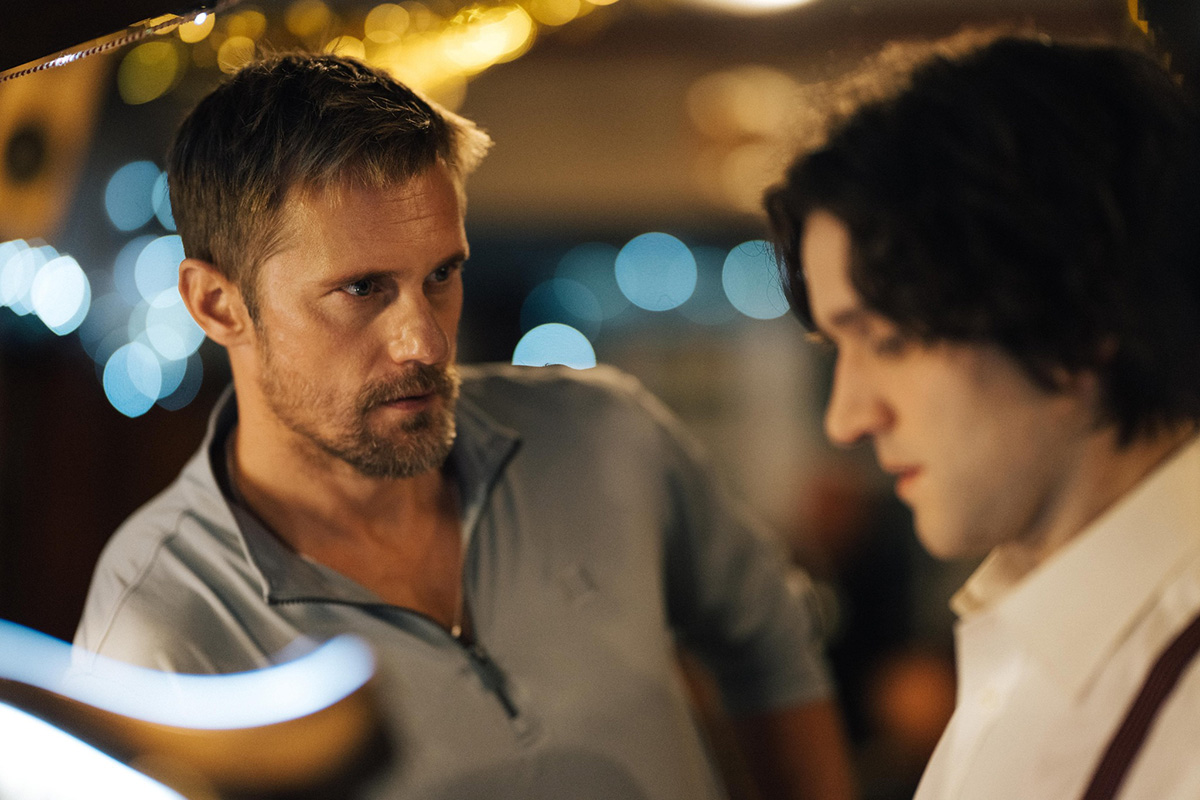
One of the highlights of last week’s Mid-Atlantic Leather Weekend came not on the dance floor, but in a movie theater. In a new partnership, the independent film studio A24 brought its leather-clad new film “Pillion” — not yet in wide release — to D.C. for special showings for the MAL crowd.
“Pillion,” a term for the motorcycle passenger seated behind the driver, delves into the complicated relationship between an introverted, quiet Londoner Colin (Harry Melling) who embarks on a journey finding himself while entering into a sub relationship with a new Dom named Ray (Alexander Skarsgård) he meets during Christmas.
It’s writer-director Harry Lighton’s feature-length debut, sharing Skarsgård’s impossibly toned physique with both Colin and audiences, and offering an eye into the BDSM community by an LGBTQ director for the general public. This from a studio that also just released a movie about ping-pong starring Timothée Chalamet.
The Washington Blade was able to catch a screening at Regal Gallery Place on Jan. 18, hosted by MAL and Gary Wasdin, executive director, Leather Archives & Museum. The Blade also had a chance to interview Lighton about the experience.
Blade: How did you get involved in this film, especially as this is your directorial debut?
Lighton: I was sent “Box Hill,” the novel on which “Pillion” is based, by Eva Yates (the head of film at the BBC). I’d spent years working on a sumo film set in Japan, and then suddenly that became impossible due to the pandemic so I was miserable. And then I read this book that I found bracing, funny, moving. All the good things.
Blade: Are you involved with the leather community? Did you draw on any personal experiences or make connections with the community?
Lighton: I’m involved in the wrestling scene but not the leather community. So I spent lots of time with people who are [in the community] during the writing process, and then ended up casting a bunch of them as bikers and pillions in the film. They were incredibly generous to myself, Harry, and Alex with their knowledge and experiences. We have them to thank for lending credibility to the world on screen.
Blade: What kind of reception have you received at film festivals and with the LGBTQ community? Was it what you imagined?
Lighton: Obviously not everyone’s going to like the film — for some people it’ll be too explicit, for some not explicit enough; some people will feel seen, some won’t. But the general reaction’s been extremely positive so far. If I’m honest I thought it would divide opinion more.
Blade: How was it working with the actors?
Lighton: I had a lot of respect for both of them going in, and wondered if that might make me a bit too deferential, a bit too Colin-coded. But besides being extremely talented, they’re both lovely. And committed. And fun! With my shorts I always felt a bit out of my depth working with actors, but here I discovered a real love for it.
Blade: Turning to the plot, the parents are pretty supportive, especially Colin’s dad. How did you decide to draw his parents? What does it mean to show parents with nuanced viewpoints?
Lighton: I wanted to reverse the typical parent-child dynamic in queer film, where parents go from rejecting to accepting their queer kid. We meet Colin’s parents actively pushing him toward a gay relationship. But when the relationship he lands on doesn’t meet her definition of healthy, his mum withdraws her acceptance. I wanted to ask: Are they projecting their romantic model onto their son, or do they have a legitimate concern for his wellbeing with Ray?
Blade: How did you decide to place the setting?
Lighton: Practically, we needed somewhere within reach of London. But I liked the idea that Colin, who lives life on the periphery, grew up on the edge of the capital. One of our producers, Lee Groombridge, grew up in and around Bromley and showed me all the spots. I loved the atmosphere on the high street, the markets, and the contrast between the high street and the idyllic park. And I thought it would be a funny place for Alexander Skarsgård to have settled.
Blade: What do you hope audiences take away from the film?
Lighton: There’s no one message. Different people will take different things from it. Personally, Colin inspires me to jump off cliffs, to push beyond my comfort zone because that’s where life begins. From Ray I get the courage to be ugly, to fly in the face of social convention if it doesn’t make you happy or it’s not built for you.
Blade: Talk about the soundtrack — especially the Tiffany “I Think We’re Alone Now” song.
Lighton: Skarsgård’s Ray has the surface masc-ness that comes with looking like a Viking. I wanted to combine that with details that indicate he’s been a part of gay culture and “I Think We’re Alone Now” is nothing if not a camp classic.
Blade: What does it mean to you to show the film at MAL?
Lighton: When I told the bikers from the film I was coming to MAL they practically wet themselves with excitement. We put a lot of thought and effort into how we depicted the community in the film and there’s so much variety, no two Masters or subs are the same, but seeing a theater full of men in leather laugh, cry, and clap for the film meant the world.
a&e features
Alexander Skarsgård describes ‘Pillion’ in 3 words: lube, sweat, leather
Highly anticipated film a refreshingly loving look at Dom-sub life
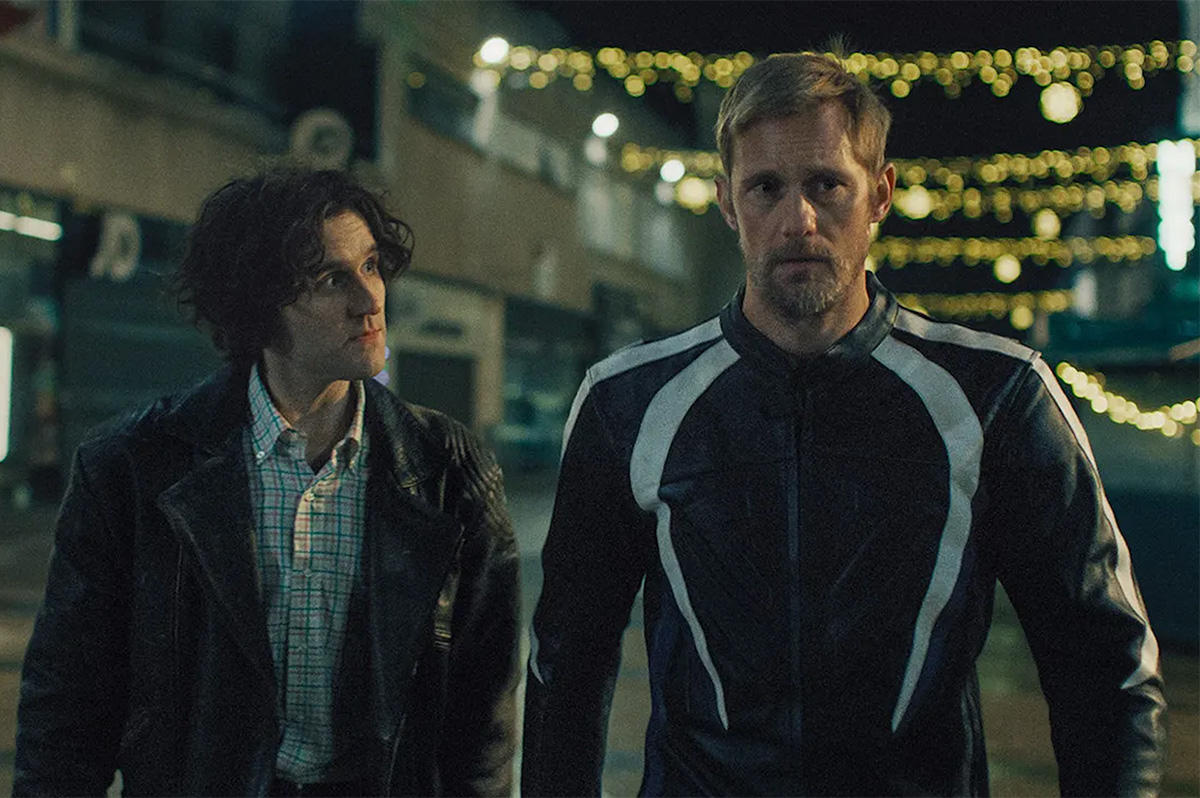
Whether you’ve seen him in popular HBO series like “True Blood,” “Succession,” and “Big Little Lies,” the dynamic Swedish actor Alexander Skarsgård has that smoldering gaze that immediately draws viewers in.
Following in the footsteps of his father Stellan, (who just won the Golden Globe for “Sentimental Value”) the Golden Globe, Emmy, and SAG winner Skarsgård continues to be an actor who is fearless in the roles he takes on.
That courageousness is evident in Skarsgård’s latest film, the BDSM black comedy “Pillion,”which he also executive produces. He plays Ray, the handsome, hyper-dominant leader of a gay bike gang. The film was written and directed by Harry Lighton, and is based on the 2020 novel “Box Hill,” by Adam Mars-Jones.
“This was a small film by a first time filmmaker and it wasn’t financed when I read it,” Skarsgård told journalists at a recent awards news conference. “And I felt that, if I could help in any small way of getting it financed, I wanted to, because I thought it was such an incredible screenplay and I believe in Harry Lighton so much as a filmmaker. And it felt tonally unlike anything I’d ever read. It was such an exciting, surprising read.”
Skarsgård was blown away by the quality of the unconventional script. “When I heard BDSM relationship, biker culture, I expected something very different. I didn’t expect it to have so much sweetness and tenderness and awkwardness.”
For the sex scenes and nudity with co-star, Harry Melling — who excels in his portrayal as Ray’s submissive Colin — Skarsgård talked very early on with Lighton about how he wanted to shoot those scenes, and why they were in the film.
“I often find sex scenes quite boring in movies because a lot of the tension is in the drama leading up to two people hooking up, or several people hooking up, as in our movie. But what I really enjoyed about these scenes — they are all pivotal moments in Colin’s journey and his development. It’s the first time he gets a blowjob. It’s the first time he has sex. It’s the first time he has an orgasm. And these are pivotal moments for him, so they mean a lot. And that made those scenes impactful and important.”
Skarsgård was happy that Lighton’s script didn’t have gratuitous scenes that shock for the sake of just shocking. “I really appreciated that because I find that when this subculture is portrayed, it’s often dangerous and crazy and wild and something like transgressive.”
He continued: “I really love that Harry wanted it to feel real. It can be sexy and intense, but also quite loving and sweet. And you can have an orgy in the woods, rub up against a Sunday roast with the family. And that kind of feels real.”
One of the obstacles Skarsgård had to work with was Ray’s emotionally distant personality.
“Ray is so enigmatic throughout the film and you obviously never find out anything about him, his past. He doesn’t reveal much. He doesn’t expose himself. And that was a challenge to try to make the character interesting, because that could easily feel quite flat…That was something that I thought quite a lot about in pre production…there are no big dramatic shifts in his arc.”
For the film, Lighton consulted the GMBCC, the UK’s largest LGBT+ biker club, attending their annual meetup at which 80 riders were present.
“Working with these guys was extraordinary and it brought so much texture and richness to the film to have them present,” said Skarsgård. “They were incredibly sweet and guiding with us — I can’t imagine making this movie without them. I’d go on a road trip with them anytime.”
Added Skarsgård: “To sum up ‘Pillion’ in three words: lube, sweat, and leather. I hope people will connect with Colin and his journey, and come to understand the nuance and complexity of his bond with Ray.”
This year is shaping up to be a busy one for Skarsgård. “Pillion” premieres in select cities on Feb. 6 and then moves into wide release on Feb. 20. After that for Skarsgård is a role in queer ally Charli XCX’s mockumentary, “The Moment,” which premieres at the Sundance Film Festival. HIs sci-fi comedy series, Apple TV’s “Murderbot,” which he also executive produces, will begin filming its second season. And this weekend, he hosts “Saturday Night Live.”
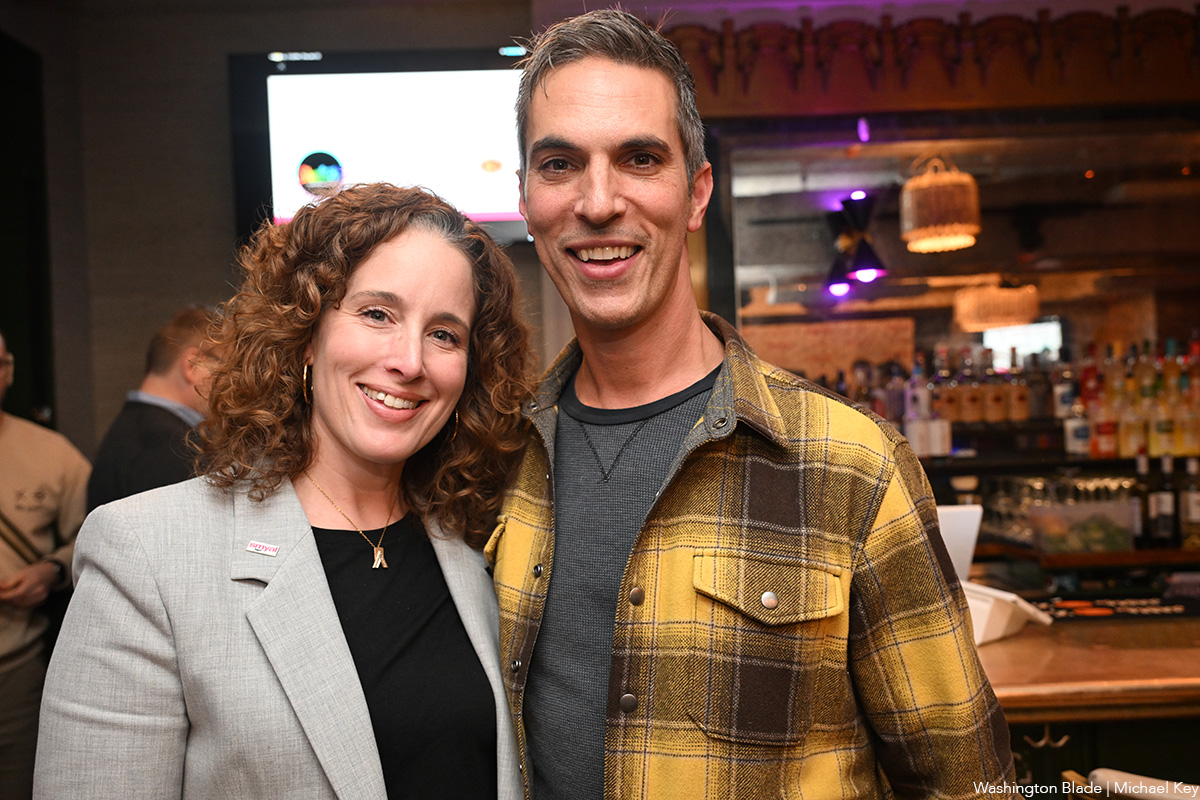
The LGBTQ youth services organization SMYAL held its annual fundraiser, ‘SMYAL for the New Year,’ at Shakiki (2012 9th Street, N.W.) on Thursday, Jan. 22.
(Washington Blade photos by Michael Key)
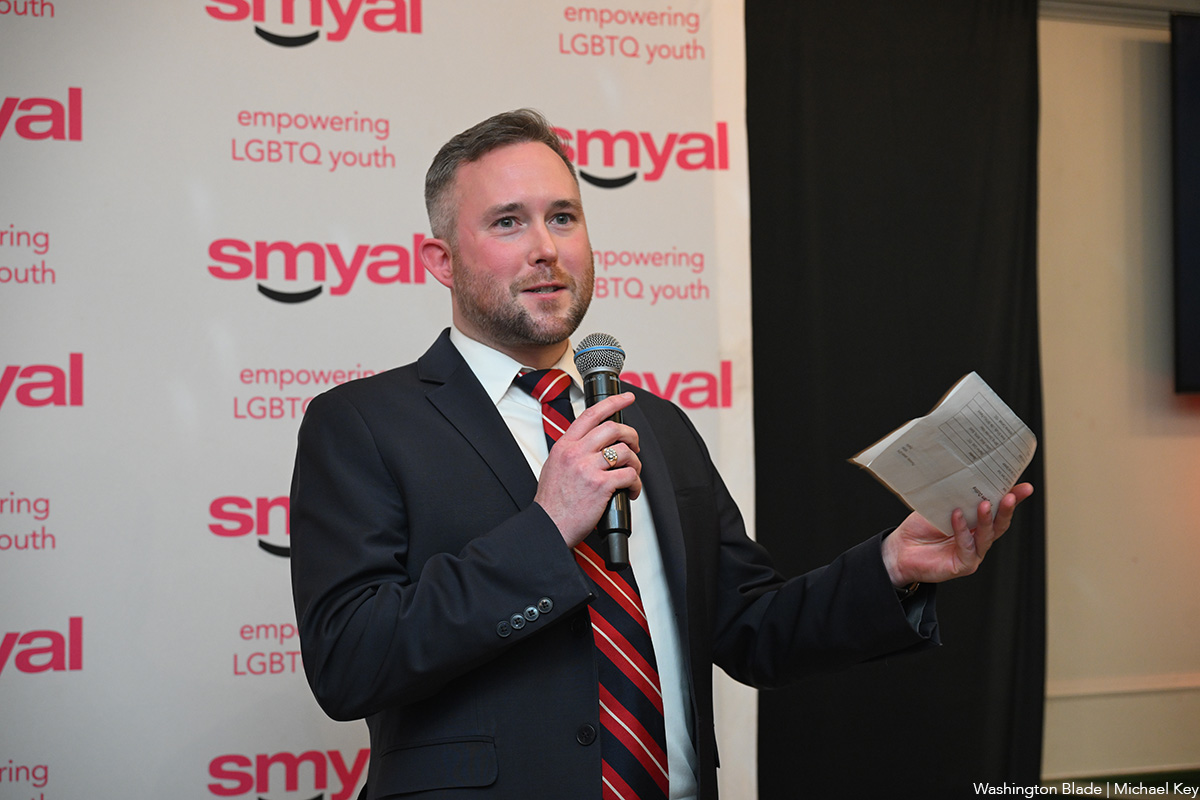
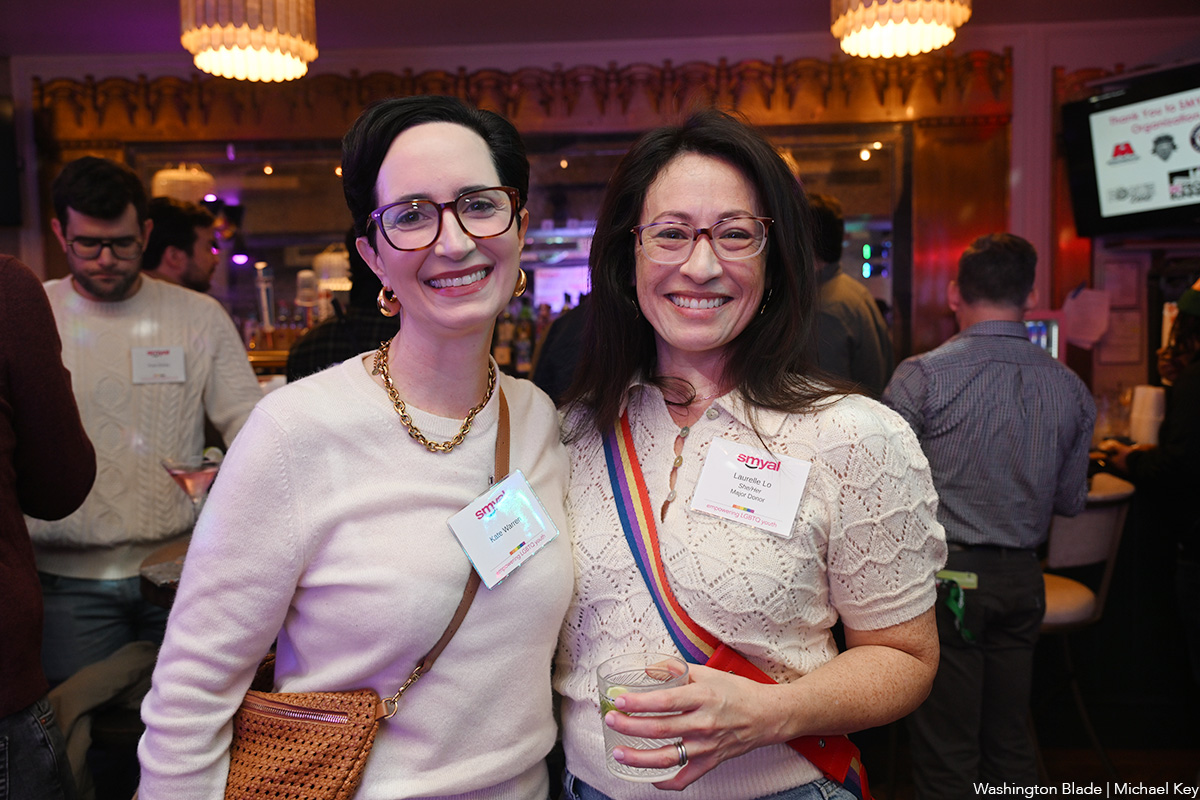
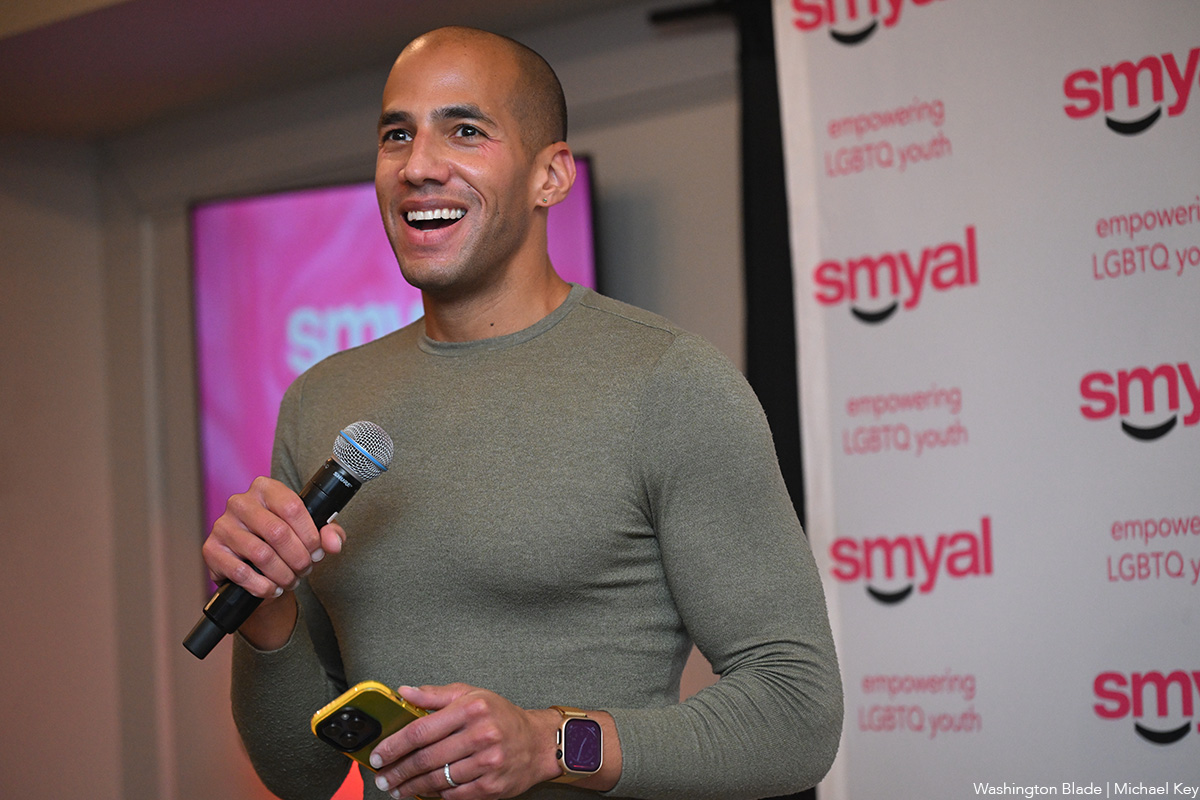
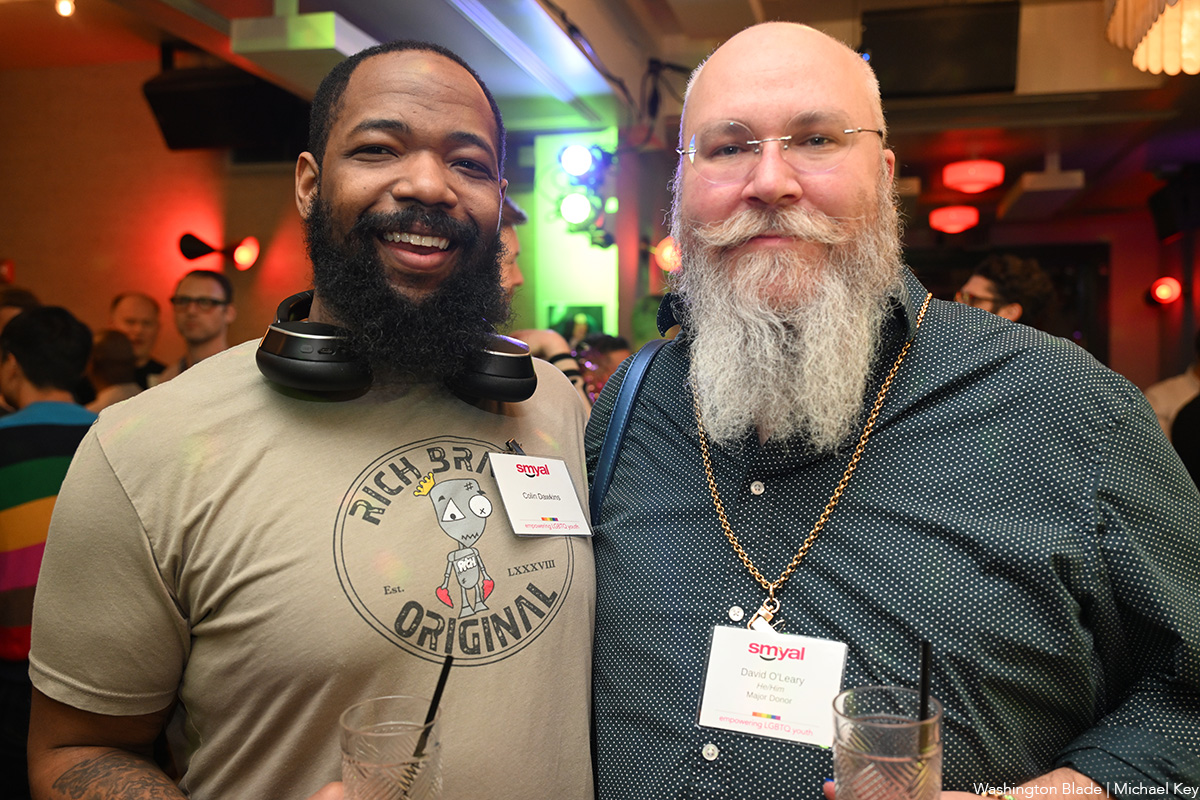
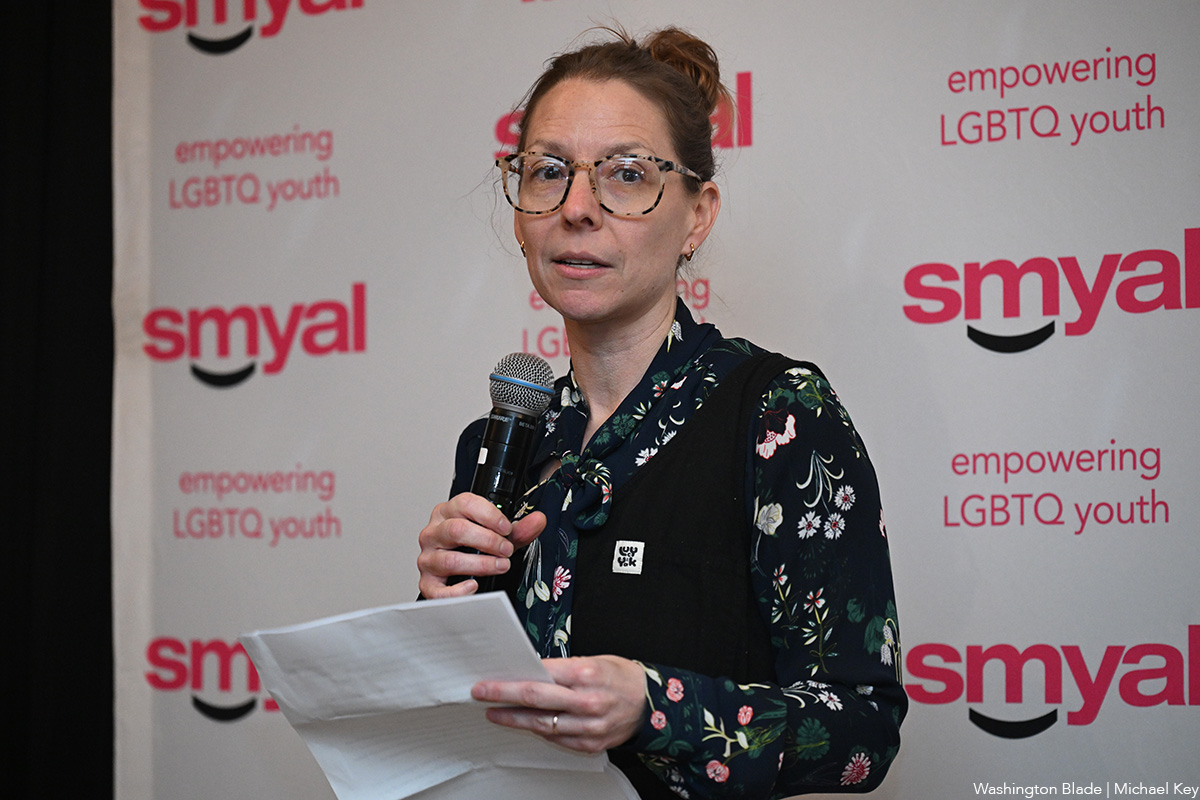
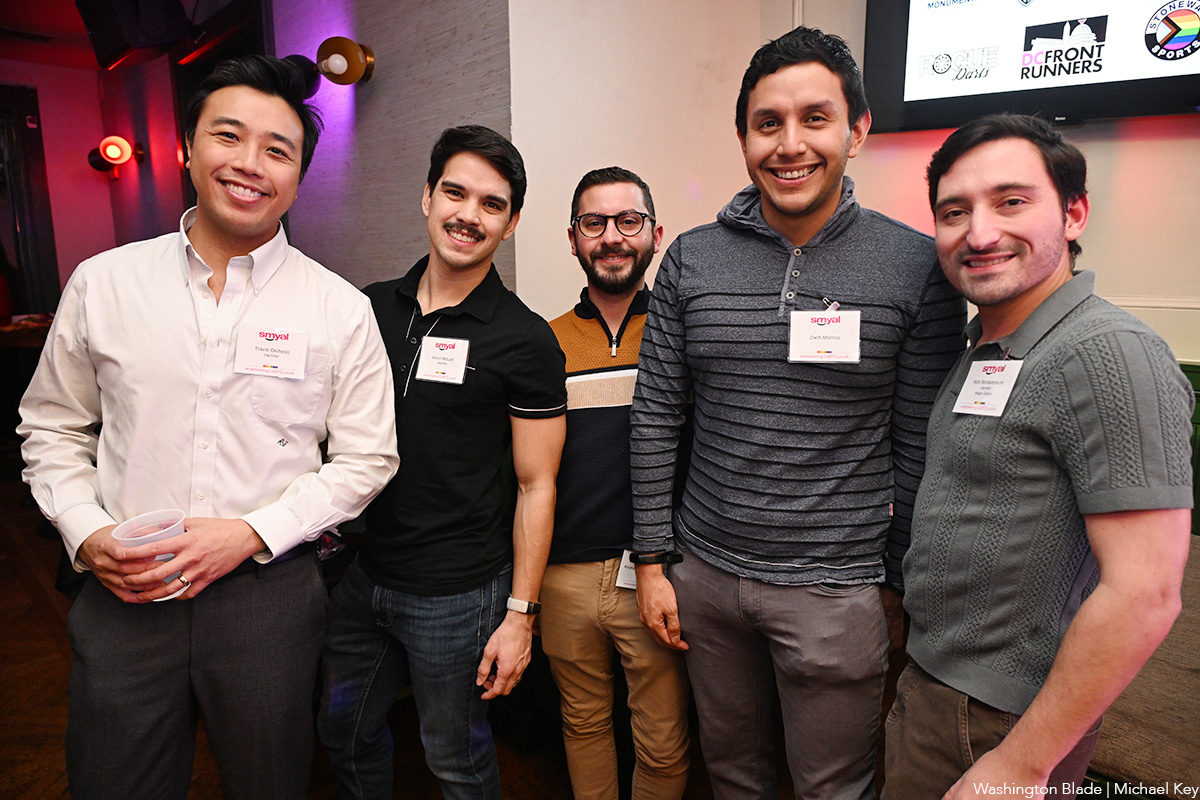
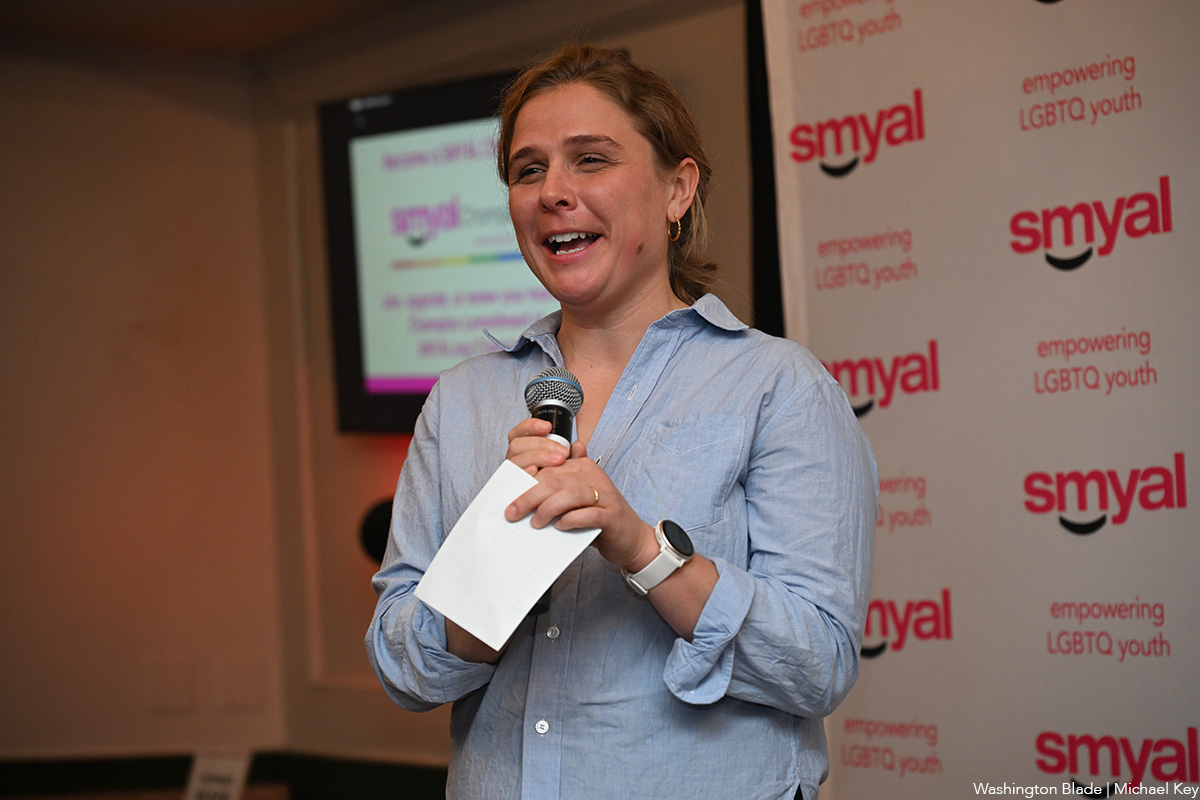
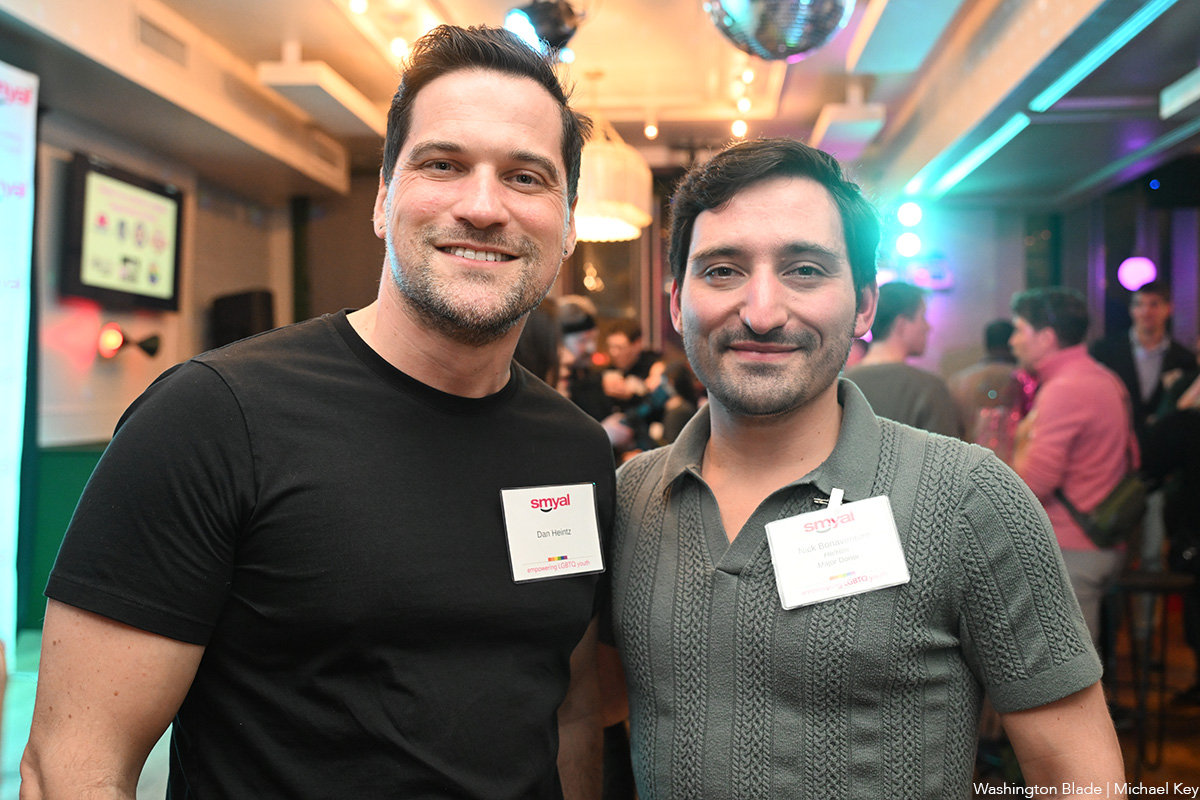
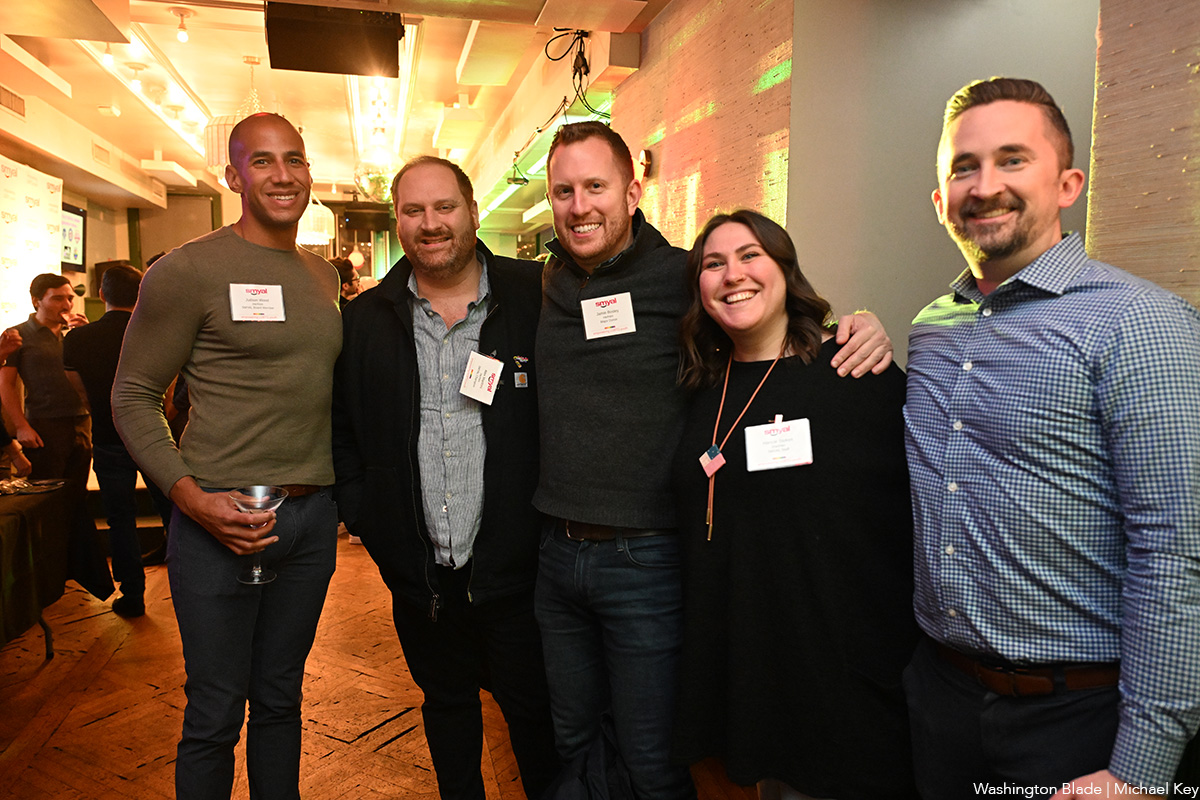
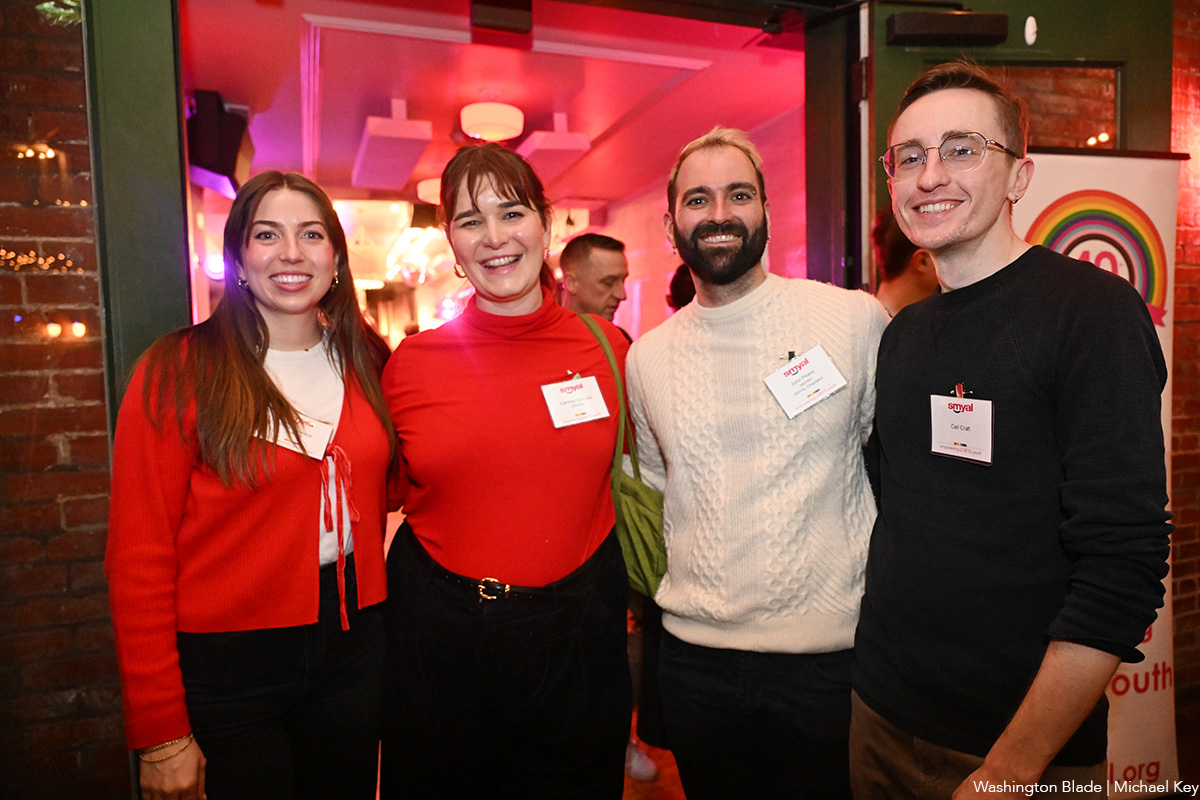
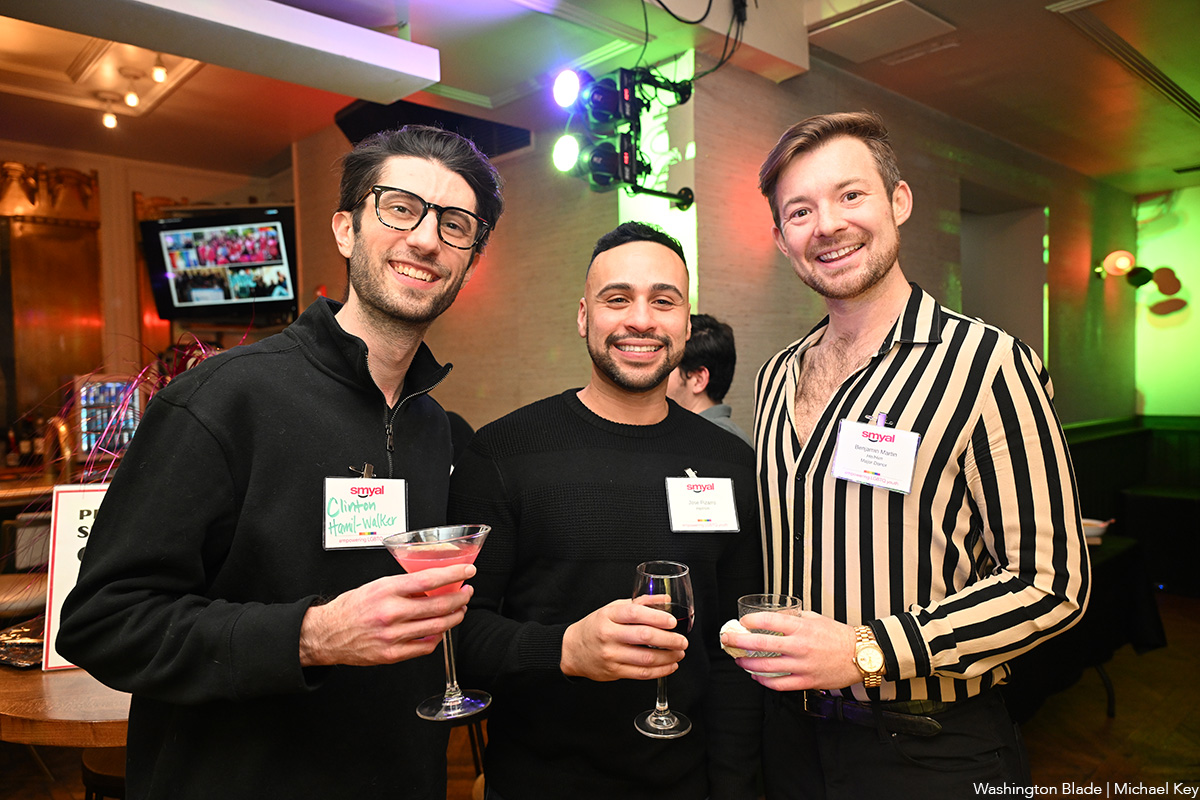
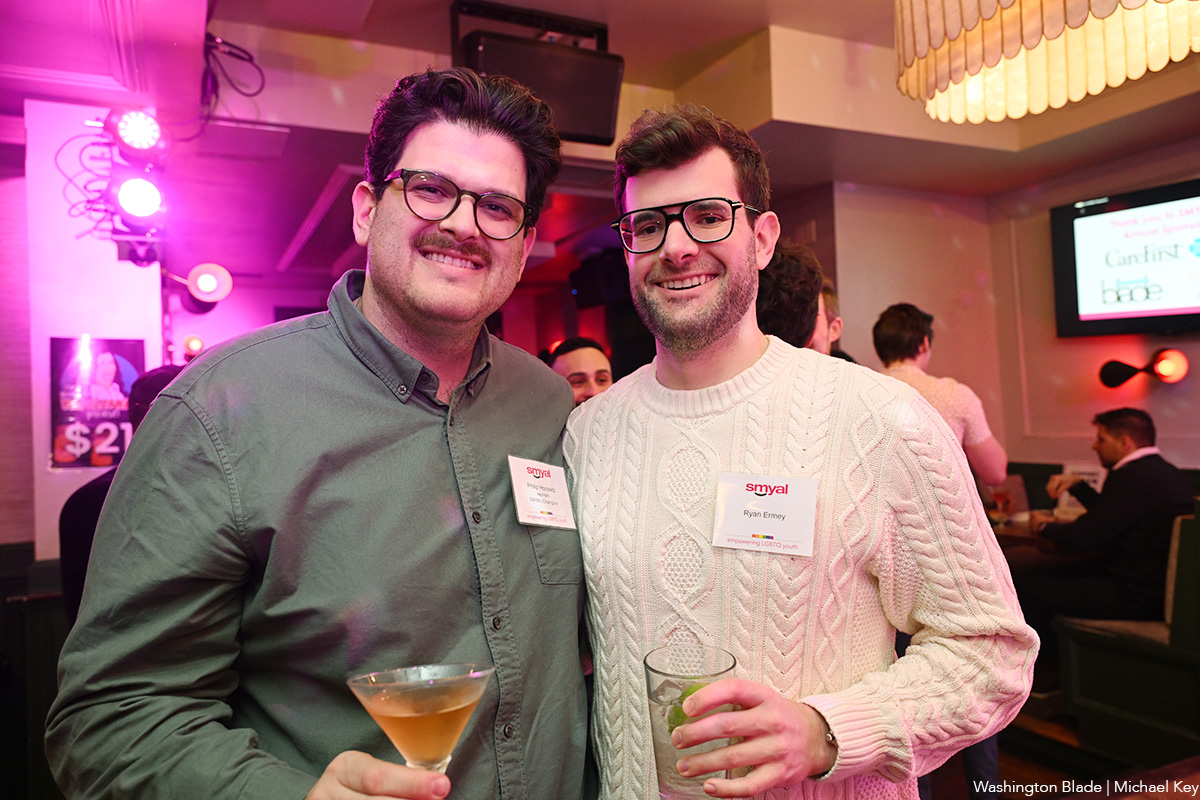
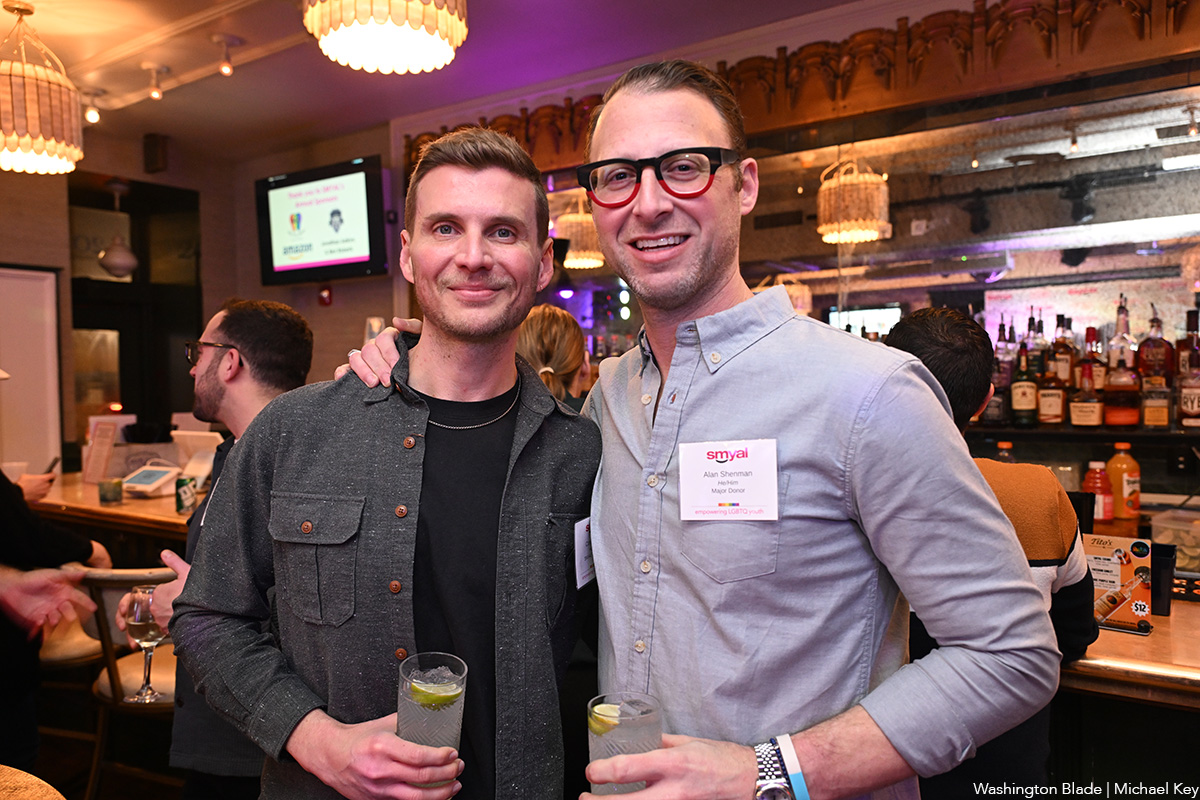
-

 Real Estate4 days ago
Real Estate4 days agoConvert rent check into an automatic investment, Marjorie!
-

 Theater4 days ago
Theater4 days agoSwing actor Thomas Netter covers five principal parts in ‘Clue’
-

 District of Columbia3 days ago
District of Columbia3 days agoEleanor Holmes Norton ends 2026 reelection campaign
-

 Honduras3 days ago
Honduras3 days agoCorte IDH reconoce a Thalía Rodríguez como familia social de Leonela Zelaya





